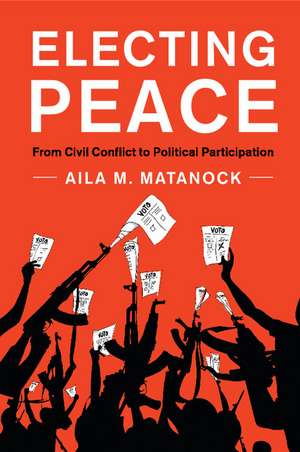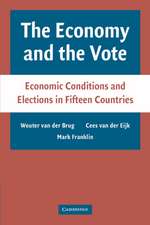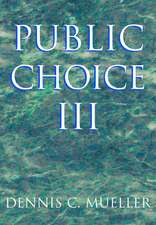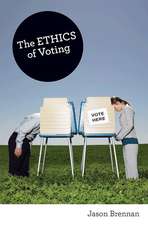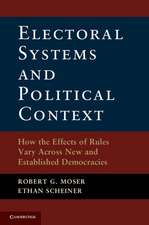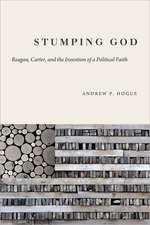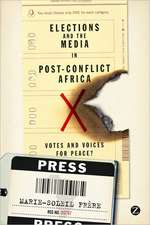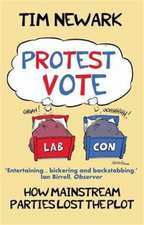Electing Peace: From Civil Conflict to Political Participation
Autor Aila M. Matanocken Limba Engleză Paperback – 28 mar 2018
| Toate formatele și edițiile | Preț | Express |
|---|---|---|
| Paperback (1) | 238.30 lei 3-5 săpt. | +17.26 lei 6-12 zile |
| Cambridge University Press – 28 mar 2018 | 238.30 lei 3-5 săpt. | +17.26 lei 6-12 zile |
| Hardback (1) | 696.45 lei 6-8 săpt. | |
| Cambridge University Press – 24 iul 2017 | 696.45 lei 6-8 săpt. |
Preț: 238.30 lei
Nou
Puncte Express: 357
Preț estimativ în valută:
45.60€ • 48.76$ • 38.02£
45.60€ • 48.76$ • 38.02£
Carte disponibilă
Livrare economică 28 martie-11 aprilie
Livrare express 13-19 martie pentru 27.25 lei
Preluare comenzi: 021 569.72.76
Specificații
ISBN-13: 9781316638811
ISBN-10: 1316638812
Pagini: 335
Ilustrații: 20 b/w illus. 19 tables
Dimensiuni: 150 x 228 x 20 mm
Greutate: 0.45 kg
Editura: Cambridge University Press
Colecția Cambridge University Press
Locul publicării:Cambridge, United Kingdom
ISBN-10: 1316638812
Pagini: 335
Ilustrații: 20 b/w illus. 19 tables
Dimensiuni: 150 x 228 x 20 mm
Greutate: 0.45 kg
Editura: Cambridge University Press
Colecția Cambridge University Press
Locul publicării:Cambridge, United Kingdom
Cuprins
Part I. Introduction and Theory: 1. Credible transitions from civil conflict: provisions for combatant participation in post-conflict elections; 2. Electoral participation provisions: a theory of external engagement; 3. International involvement over time: changes with the end of the Cold War and patterns there-after; Part II. Causes of Electoral Participation Provisions: 4. Trading bullets for ballots: examining the inclusion of electoral participation provisions; 5. Shifting expectations of engagement: paving a path for peace agreements based on electoral participation provisions; Part III. Consequences of Electoral Participation Provisions: 6. Participating for peace: examining the effect of electoral participation provisions on peace; 7. Engaging through elections: external observation and incentives around elections during implementation; Part IV. Conclusion: 8. Securing peace: conclusions about electoral participation and external engagement in post-conflict states.
Recenzii
'Matanock's terrific book sheds light on the relatively new phenomenon of crafting peace agreements that include provisions for the political participation of former rebels. She uses new data to deftly weave together analysis of peace agreements, peacekeeping, peace duration, elections, and election monitoring - topics that are typically considered separately – and provide a comprehensive and compelling argument for the importance of formally integrating former rebels into post-conflict governance.' Tanisha Fazal, University of Minnesota
'Almost half of all elections globally occur in the shadow of violent conflict, and post-conflict elections have become vital international tools of peacebuilding and democratization. Yet these elections, fraught with tension and high stakes, have an unenviable track record: as often as not, they lead to conflict recidivism and democratic decline. Against this backdrop, Aila M. Matanock's Electing Peace sounds a clarion call to keep the faith. The key is to create a path for yesterday's combatants to become tomorrow's politicians. When such a path is seen as credible by warring parties, they are more likely to trade tanks for campaign buses and guns for microphones. This is a must-read for academics and policymakers who aspire to build peace through democracy in conflict-afflicted countries.' Irfan Nooruddin, Georgetown University, Washington DC, and author of Elections in Hard Times
'Aila M. Matanock helps solve one of the hardest problems associated with civil wars: how to get a successful peace agreement without the help of a third party military intervention. Using new cross-national data on peace agreements and detailed analysis of Guatemala and El Salvador, Matanock shows us how electoral participation can help combatants enforce agreements. Bravo!' Barbara F. Walter, University of California, San Diego
'Matanock provides a refreshingly positive and constructive appraisal of democratic peacebuilding … Matanock's study is a much-welcomed contribution to the field and one that will be of great value to both policymakers and academics.' Richard Lappin, Democratization
'Electing Peace advances our thinking and knowledge about the range of options available to facilitate peace agreements and ultimately long-term peace.' Beth A. Simmons, Democratization
'Perhaps the most important contribution of Electing Peace is the insight it offers into ongoing debates over the dangers of democratization, as well as whether postconflict elections incite a return to violence. Matanock tackles these timely questions with clarity and authority. This is an exemplary piece of scholarship whose attention to context and nuance rewards its readers with generalizations that are at once 'big' and 'bounded' … As such, it is an important book that deserves a wide audience.' Daniela Donno, Perspectives on Politics
'Matanock's book is a must-read for all scholars and practitioners interested in understanding how elections and outside engagement can help end modern civil wars.' Hannah Smidt, Africa Spectrum
'The extremely thorough research approach, the systematic approach of the author and her invigorating mixture of fundamental political considerations with statistical material and interview results make the book … not only worth reading for dealing with the special election aspect after civil wars, but also in general for the topic of Peace processes after civil wars.' Burkhard Luber, Milieu
'Almost half of all elections globally occur in the shadow of violent conflict, and post-conflict elections have become vital international tools of peacebuilding and democratization. Yet these elections, fraught with tension and high stakes, have an unenviable track record: as often as not, they lead to conflict recidivism and democratic decline. Against this backdrop, Aila M. Matanock's Electing Peace sounds a clarion call to keep the faith. The key is to create a path for yesterday's combatants to become tomorrow's politicians. When such a path is seen as credible by warring parties, they are more likely to trade tanks for campaign buses and guns for microphones. This is a must-read for academics and policymakers who aspire to build peace through democracy in conflict-afflicted countries.' Irfan Nooruddin, Georgetown University, Washington DC, and author of Elections in Hard Times
'Aila M. Matanock helps solve one of the hardest problems associated with civil wars: how to get a successful peace agreement without the help of a third party military intervention. Using new cross-national data on peace agreements and detailed analysis of Guatemala and El Salvador, Matanock shows us how electoral participation can help combatants enforce agreements. Bravo!' Barbara F. Walter, University of California, San Diego
'Matanock provides a refreshingly positive and constructive appraisal of democratic peacebuilding … Matanock's study is a much-welcomed contribution to the field and one that will be of great value to both policymakers and academics.' Richard Lappin, Democratization
'Electing Peace advances our thinking and knowledge about the range of options available to facilitate peace agreements and ultimately long-term peace.' Beth A. Simmons, Democratization
'Perhaps the most important contribution of Electing Peace is the insight it offers into ongoing debates over the dangers of democratization, as well as whether postconflict elections incite a return to violence. Matanock tackles these timely questions with clarity and authority. This is an exemplary piece of scholarship whose attention to context and nuance rewards its readers with generalizations that are at once 'big' and 'bounded' … As such, it is an important book that deserves a wide audience.' Daniela Donno, Perspectives on Politics
'Matanock's book is a must-read for all scholars and practitioners interested in understanding how elections and outside engagement can help end modern civil wars.' Hannah Smidt, Africa Spectrum
'The extremely thorough research approach, the systematic approach of the author and her invigorating mixture of fundamental political considerations with statistical material and interview results make the book … not only worth reading for dealing with the special election aspect after civil wars, but also in general for the topic of Peace processes after civil wars.' Burkhard Luber, Milieu
Notă biografică
Descriere
This book examines the causes and consequences of post-conflict elections in securing and stabilizing peace agreements without the need to send troops.
